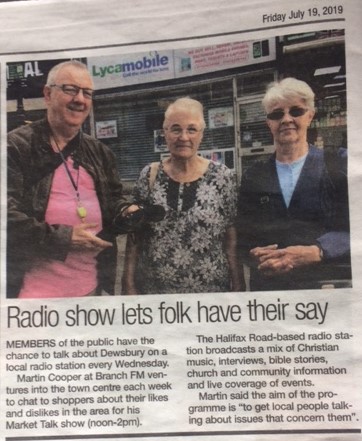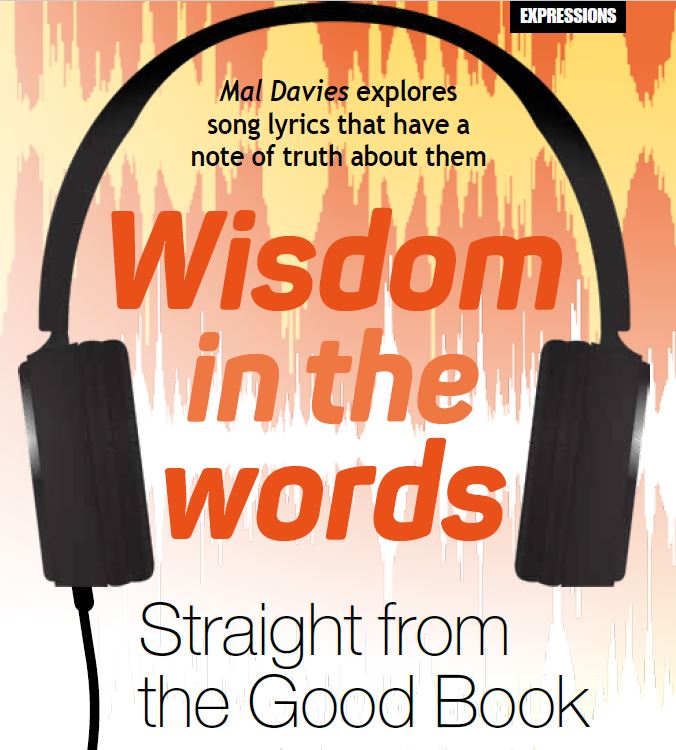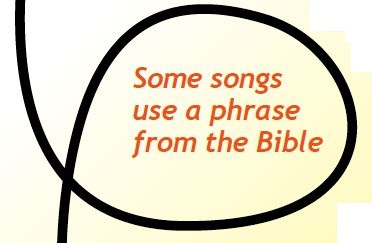This article brings together the tambourines and trumpets of the Salvation Army, radio broadcasting, and some great pop songs. The tambourines come much later, but first let me explain.
I have been presenting a weekly chat show for Branch FM in Dewsbury, Yorkshire, since 2018. The idea is simple. It’s called “Market Talk” and goes out on Wednesday lunchtimes between 12 noon and 2 o’clock. That’s when Dewsbury’s mid-week market is held, and has traditionally been the biggest day of the week for the town’s merchants and the open-air market. The newspaper cutting here comes from an edition of the Dewsbury Press in 2019.

Before the programme goes on air, I spend the morning talking to shoppers, and chatting about anything: from their memories of growing up with their brother or sister, their pets, their favourite personalities, to where they hope to spend their holidays – if they could go anywhere.
After recording a whole handful of conversations I’d head (in those pre-Covid times) for a quick coffee in one of Dewsbury’s fine cafes. But first I’d walk past the Salvation Army lady. Every Wednesday she’d be there – at the top of the pedestrian street near the market gates, whilst I was doing my interviews at the bottom of the same short street.
I’d always buy a copy of the Salvation Army’s weekly news magazine from her. It’s called War Cry – and has been published continuously since 1879.
After reading it over a coffee, I’d head up to the radio station in time for my Wednesday lunchtime show.

Later, during the COVID lockdowns of 2020, I linked up with a Salvation Army bandsman who is based in Berkshire and has launched an online radio station playing exclusively brass band music – from an archive of 78 rpm recordings of Salvation Army bands. You can find out more about Stuart Hall’s project at www.fortressradio.online. I’ve had a long conversation with Stuart and have been able to help and encourage him with ideas as he develops his radio station.


But let me come back to that War Cry magazine. In the 10th April 2021 edition, it featured an article by Mal Davies.
And here I want to highlight how the Salvation Army is such a wide-ranging organisation. It provides help for the homeless and those on the margins of society; it runs mobile canteens to help emergency services at scenes of major incidents, and it offers some of the best – and loudest – unamplified live music around.

Indeed, music is at the very heart of the Salvation Army. You will have seen their bands playing carols in the street in December. So this is why I want to share Mal Davies’ article. The editorial team at War Cry have given me permission to reproduce it here. Find out more about the magazine, and subscribe at https://www.salvationarmy.org.uk/publications/war-cry.
Major Mal Davies writes,
For 2,000 years, Christianity has had a huge influence on various parts of our culture, including the arts, literature and music. Not surprisingly, this extends to what could be classed broadly as ‘popular music’ – the music that has ‘hit the charts’ since the arrival of rock’n’roll in the late 1950s.
Sometimes this influence is obvious, especially in songs that either use Bible texts directly (such as Boney M’s ‘Rivers of Babylon’ based on Psalm 137, or the Byrds’ ‘Turn! Turn! Turn!’ based on Ecclesiastes 3). Other songs refer to God or Jesus directly (such as Norman Greenbaum’s ‘Spirit in the Sky’ or Joan Osborne’s ‘One of Us’).
Some songs, however, are more subtle and use a phrase from the Bible or allude to something related to Christianity or the Church. A good example is Van Morrison’s ‘Bright Side of the Road’, in which he sings: ‘And time seems to go by so fast,/ In the twinkling of an eye.’
Many listeners wouldn’t pick up on it, but as he sings this, Van Morrison quotes the Bible. In Paul’s First Letter to the Corinthians, the apostle looks ahead to the last days and eternal life, and he says: ‘We will all be changed – in a flash, in the twinkling of an eye’ (15:51 and 52 New International Version).
A few other examples of artists referring to the Bible would be Mumford & Sons’ ‘Babel’ (referencing Genesis 11), Sia’s ‘Eye of the Needle’ (Matthew 19), Hozier’s ‘Movement’ (Jonah 2) and Bon Jovi’s ‘Blaze of Glory’ (Genesis 4) just for starters.
It’s hard to imagine what the world would look like if all the Bible references suddenly disappeared. Whether you’re a Christian or not, your world would change. Every time you sing about the ‘brokenhearted’, you’re quoting Psalm 34:18; ‘a sign of the times’ is from Matthew 16:3; to ‘harden your heart’ is from Exodus 4:21, and the ‘apple of your eye’ comes from Deuteronomy 32:10.
So, the next time you sing along to a song on the radio, you might be quoting the Bible.
War Cry, 10 April 2021, p. 13.
If you have any other examples from pop culture, let me know in the comment box below. But, back to the tambourines. Listen carefully, because this alone is a great reason to watch the Prince classic:
Send me a message and let me know you heard it in the mix (from about 1’32” I reckon, but you’ll struggle to make it out if you’re only listening on your tiny mobile phone speakers; this is a tune that needs some serious amplification). And also, as you listen to those lyrics from 1987, consider what a serious message Prince was putting forward. Thank you for your support.
loud unamplified music – I like it. great stuff
LikeLike